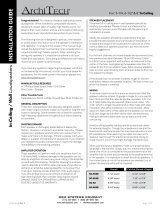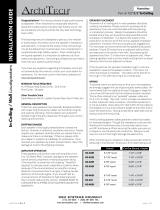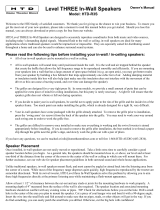
Congratulations on your purchase of the AudioSource
AE Series In-Ceiling Speaker System. This product is
designed to reproduce the audio portion of your
home entertainment environment with accuracy and
detail that will satisfy the most discriminating listener.
Please read this Installation Manual to ensure the
proper installation and performance of your AE Series
speakers.
Preparing for your Installation
Gather the necessary tools for your installation.
You will need the following tools:
1) A Keyhole or Drywall Saw
2) A Phillips Screwdriver
3) Masking Tape
4) A Pencil
5) A Tape Measure
6) A Stud Finder (recommended)
7) Your AE Series speakers
Placement
Plan your speaker placement carefully. Make certain
that electrical, plumbing and any other services will not
interfere within the ceiling where you plan to install your
speakers. The AE Series speakers can be mounted in
walls, but are typically used in ceilings. The speakers
should be located so that they provide even coverage
at your listening position. The distance between the
speakers should not be greater than the distance from
the speakers to the listening position (See Figure 1).
If the room’s dimensions or furniture placement prevent
adhering to this requirement, the tweeters in the AE
Series speakers can be swiveled to aim them at the
desired listening position.
New Construction
If you are installing your speakers in new construction
before the finished walls go up, AudioSource offers
New Construction Brackets, which provide a stable
frame that can be fastened to the wall studs or
ceiling joists on 16” or 24” centers. This allows the
sheet rock or other surface covering to be installed
and provides a template to cut the opening for the
AE Series speakers.
AE5C/AE6C/AE8C
Use a stud finder to locate the joists behind the ceiling
surface. Also, you should now check for obstructions
like cross bracing in front of and behind the desired
speaker location.
5“/6.5”/8” 2-Way In-Ceiling Speakers
11’
16’
20’
11.5’
Figure 1
Existing Construction
In most modern buildings ceiling joists are positioned
on 16” centers, providing a space between the joists of
approximately 14 3/8”. The specifications chart shows
the appropriate cut out sizes (p. 4). Additionally, you
should allow an extra 3/4” in all directions behind the
ceiling surface to allow room for the screw clamps that
mount the speaker to the ceiling to swing into position.

After selecting the mounting location, mark the hole to
be cut out. A template is provided in the speaker box.
Locate and align the template, then mark with pencil on
the ceiling surface. If you are unsure whether there are
obstructions behind the ceiling surface where the
speakers are to be mounted, cut a small hole in the
center of your marked mounting location. Holding your
drywall saw at a 45 degree angle (See Figure 2), cut a
square hole that you can use to locate any obstructions,
should they exist.
The 45 degree wedge shape of the removed surfacing
material will make replacement, if necessary, a much
easier task and yield a better finish when patching the
work.
Once it has been determined that there are no obstruc-
tions, cut the hole to mount the speaker using the drywall
saw at a 90 degree angle to the ceiling surface. Cover
the raw edges of the wallboard with masking tape
(See Figure 3). This will prevent the back pressure of the
speaker from blowing loose gypsum dust out and onto
the painted ceiling surface after installation. Do not allow
the tape to extend more than 1/4” beyond the edge of the
hole into the room. The frame of the speaker will cover
and hide the tape.
Next run your speaker wire to your speaker locations.
A UL rated CL3 speaker wire is recommended when
running wire inside your walls. In many areas it may
be required by code. When running your speaker wire
you should avoid having the speaker wire run parallel
to the 120V power lines to avert picking up hum and
interference from the power service. If the speaker
wire needs to cross a 120V power line at a right angle
this is acceptable and will not create a problem.
If you are uncomfortable with running the speaker wire
yourself in existing construction, it is recommended that
you retain a qualified custom home installation specialist
or electrician.
Installing the Speakers
Installation Tip! To further enhance the performance of
your AE Series speakers, the ceiling joist cavity where
you plan to place your speakers can be stuffed with a
generous quantity of fiberglass insulation. Stuff the area
in front of and behind the speaker opening with 6” thick
insulation to a depth of approximately 2 feet beginning
1 foot in front and 1 foot behind the speaker opening. If
the insulation is foil or paper backed, face the backing
away from the AE Series speaker. The addition of this
insulation will help prevent unwanted transfer of sound
into the otherwise large and resonant cavity of the un-
ROOM
Figure 3
ROOM
Masking T.ape
Figure 2
insulated ceiling.
It is now time to connect the speaker wire to the speaker.
Your speaker wire is usually coded to identify each
conductor as either positive or negative. This can be by
color coding, or one conductor may have a printed
marking or at least a rib along one edge that you will not
find on the other. Identify which type of polarity coding
that your wire is using. You must carefully observe that
the positive terminal of the speaker output on your
amplifier is connected to the positive terminal of the
AE Series speaker. Likewise, the negative terminal of the
amplifier’s speaker output should be connected to the
negative terminal of the AE Series speaker (Figure 5).
(+) Amp
(-) Amp
2
Grill Removal for Installation
CAUTION! The grill is held in place by contact pressure
around the edges where it attaches to the speaker frame.
To avoid difficulty reinstalling the grill, care should be
taken to not distort its shape while removing it.
While looking at the rear of the speaker assembly, rotate
two of the adjacent mounting clamps outward and then
evenly press them towards the grill. The clamp screws
contact the inner surface of the grill, pushing it gently
out of its mounting groove (Figure 4). Only lift the grill
1/4" (6mm) at this location. Next use the other mounting
clamps to further loosen the grill. Use care to not distort
the grill shape.
1/4"(6mm)
Figure 4
Figure 5

3
Tighten all four of the mounting screws in the same
manner until the speaker is properly aligned and held
tight to the ceiling surface.
Painting the Speaker
Two paint shields are included in each AE Series
speaker package. Place the paint shield inside the
frames to protect the speakers. You can now safely
paint the speaker frames to match your wall surface
if you desire.
When painting the grill caution should be taken to
ensure that paint does not clog or congest the
perforated openings in the grill. This would prevent
proper operation of the grill by restricting the airflow
from the individual drivers in the speaker.
Aiming the Tweeter
Carefully place your fingertips at the plastic edges of the
tweeter housing.
Removing the AE Series Speaker
Should it ever become necessary to remove the AE
Series speaker from the ceiling, simply remove the
grill and turn the four mounting screws counter-
clockwise until you feel the clamps lock out of position
in their resting flanges. The speaker should easily come
out of the wall for service or replacement.
Press Here
Press Here
Press Here
Press Here
Caution: Do not over tighten!
Recommended Speaker Wire Gauges
The resistance of the speaker wire in your installation
can cause your speakers to perform at less than their
optimum quality level. Excess resistance caused by
using an undersized speaker wire can result in loss of
detail and definition in the bass region of your audio
program, as well as loss of dynamic range. Over
extremely long wire runs you may even experience a
loss of high frequency content in the audio signal.
50’ or less - 16 Gauge 2-Cond. CL3 Rated
50’ - 150’ - 12 Gauge 2-Cond. CL3 Rated
150’ - 200’ - 10 Gauge 2-Cond. CL3 Rated
To prevent sonic degradation in your AE Series
speaker installation, total speaker wire resistance
should be kept below 0.5 ohms. The following table
lists recommended speaker wire gauge versus wire
run length.
Using gentle pressure, swivel the tweeter to aim the axis
of the tweeter toward the listening area. You can use a
piece of music with a solid center-imaged vocalist to
assist in correctly aiming the tweeter. When the
tweeters are properly aligned, you will hear a coherent
and stable center image from your listening position.
Usually, it is sufficient to aim the tweeter only as it
handles the frequencies that control the direction of
individual sounds in your audio program material.
Next make sure that the clamps are positioned inside the
the frame of the speaker.
With the grill removed, place the speaker in the ceiling
opening. Make sure that the speaker wire is not hanging
against the speaker where it can vibrate and rattle as the
speaker reproduces your audio program.
Next, one at a time, turn
each of the four screws
that operate the clamps
counter clockwise a few
turns until you feel the
clamp is loose from its
resting position. Now turn
the screw clockwise until
you feel the clamp contact
the ceiling surface.
Correct
1
2
3
4
Incorrect
Locate a small hook tool
(available at most auto parts
stores or home improvement
shops, resembling a dentist’s
pick- a bent paper clip or
stiff wire will work as well),
hook the metal mesh of the
grill near a corner or edge
and gently pull it towards you.
Only lift the grill 1/4" (6mm) at
this location. Move the tool
1-2" (25-50mm) and repeat
until the grill can be removed
without damaging it (Figure 6).
Grill Removal (if installed)
Figure 6

4
AE6C
Specifications
Woofer
Tweeter
Frequency Response
Impedance
Sensitivity
Power Capacity
Outer Dimension
Cut Out Dimension
Mounting depth
6.5” Carbon Filled Poly Cone w/Butyl Rubber Surround
Pivoting 19mm Poly ferrofluid Cooled
50Hz to 20kHz
8 ohm
87dB, 2.83v @ 1m
10 to 100 Watts
9” (229mm) diameter
7.75” (197mm) diameter
2.90” (73mm)
8100.0367B
AE5C
Specifications
Woofer
Tweeter
Frequency Response
Impedance
Sensitivity
Power Capacity
Outer Dimension
Cut Out Dimension
Mounting depth
5.25” Carbon Filled Poly Cone w/Butyl Rubber Surround
Pivoting 19mm Poly ferrofluid Cooled
70Hz to 22kHz
8 ohm
87dB, 2.83v @ 1m
10 to 100 Watts
8” (203mm) diameter
6.63” (168mm) diameter
2.75” (70mm)
AE8C
Specifications
Woofer
Tweeter
Frequency Response
Impedance
Sensitivity
Power Capacity
Outer Dimension
Cut Out Dimension
Mounting depth
8” Carbon Filled Poly Cone w/Butyl Rubber Surround
Pivoting 25mm Poly ferrofluid Cooled
40Hz to 20kHz
8 ohm
88dB, 2.83v @ 1m
10 to 100 Watts
10.75” (273mm) diameter
9.60” (236mm) diameter
3.60” (92mm)
New Construction Bracket Order Part Number: BC5
New Construction Bracket Order Part Number: BC6
New Construction Bracket Order Part Number: BC8
Two Year Limited Warranty
AudioSource, a division of Peak Audio Group, warrants this product against defects in materials and workmanship
for a limited period of time. For a period of two (2) years from date of original purchase, we
will repair or replace the product, at our option, without charge for parts. Customer must pay for all labor
charges associated with the removal and re-installation of speakers for the limited period and all parts and
labor charges after the limited warranty period expires. The limited warranty period for factory refurbished
products expires after ninety (90) days from date of original purchase. This limited warranty applies only to
purchases from authorized AudioSource Retailers or Distributors. This limited warranty is extended only to
the original purchaser and is valid only to consumers in the United States.
Consumers are required to provide a copy of the original sales invoice from an authorized AudioSource
Retailer or Distributor when making a claim against this limited warranty. This limited warranty only covers
failures due to defects in materials or workmanship that occur during normal use. It does not cover failures
resulting from accident, fire, flood, misuse, abuse, neglect, mishandling, misapplication, alteration, faulty
installation, modification, service by anyone other than AudioSource , or damage that is attributable to Acts of
God. It does not cover costs of transportation to AudioSource or damage in transit. The customer should
return their defective product, freight prepaid and insured, to AudioSource only after receiving a Return
Authorization.
Repair or replacement under the terms of this warranty does not extend the term of this warranty. Should a
product prove to be defective in workmanship or material, the consumer's sole remedies will be repair or
replacement as provided under the terms of this warranty. If the defective product is discontinued
AudioSource may replace the product with an equivalent or superior product at its option. Any cost
of re-installation or repair of wall or ceiling surface is the sole responsibility of the customer and that cost
shall not be the responsibility of AudioSource. Under no circumstances shall AudioSource be liable
for loss or damage, direct,consequential or incidental, arising out of the use of or inability to use the
product. There are no express warranties other than described above.
/




